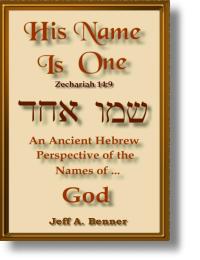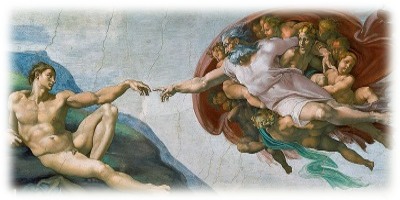Topics  God & YHWH God & YHWH 

The Hebrew Word for God
By Jeff A. Benner
The following is an excerpt from Jeff Benner's Book "His Name is One."
Let us begin our investigations of the names of God with the name by which he is most commonly called, "God." When you hear the word "God", what comes to mind? Our culture has produced two different views of whom or what God is. The first is an old man with white hair and beard sitting in the clouds. While this seems more like a children’s picture of God, it is many adults as well, probably because of the stories we hear as children, which remain with us into adulthood. Another common view is an invisible force that spans the universe, unknowable and untouchable. However we view God when reading the text, it is irrelevant, as we must learn to view God in the same manner that the ancient Hebrews who wrote the Biblical text did.
There are three different words used in the Bible that are translated as God; אל (el), אלוה (elo'ah) and אלהים (elohiym). The first of these is a two-letter parent root and is the foundation for the other two that are derived from it.
Abstract vs. concrete thought
We have previously discussed the differences between the modern Western thinker's method of describing something compared to the ancient Hebrew Eastern thinker. Here we will look at another major difference between the two, which impacts how we read the Biblical text.
The Eastern mind views the world through concrete thought that is expressed in ways that can be seen, touched, smelled, tasted or heard. An example of this can be found in Psalms 1:3 where the author expresses his thoughts in such concrete terms as; tree, streams of water, fruit, leaf and wither.
|
"He is like a tree planted by streams of water, which yields its fruit in season, and whose leaf does not wither." (NIV)
|
The Western mind views the world through abstract thought that is expressed in ways that cannot be seen, touched, smelled, tasted or heard. Examples of Abstract thought can be found in Psalms 103:8;
|
"The LORD is compassionate and gracious, slow to anger, abounding in love." (NIV)
|
The words compassion, grace, anger and love are all abstract words, ideas that cannot be experienced by the senses. Why do we find these abstract words in a passage from concrete thinking Hebrews? Actually, these are abstract English words used to translate the original Hebrew concrete words. The translators will often substitute a concrete word with an abstract word because the original Hebrew concrete imagery would make no sense when literally translated into English.
Let us take one of the above abstract words to demonstrate the translation from the concrete into the abstract. Anger, an abstract word, is actually the Hebrew word אף (aph), which literally means "nose", a concrete word. When one is very angry, he begins to breathe hard and the nostrils begin to flare. A Hebrew sees anger as "the flaring of the nose (nostrils)." If the translator literally translated the above passage "slow to nose", the English reader would not understand.
While the uses of abstract thoughts are commonplace to us and we read them freely without notice, it is essential to see the concrete thoughts behind the abstract thoughts of the translations so that the original meaning of the text can be seen. These abstract thoughts would be as foreign to the author of the text as the idea of being "slow to nose" is to us. As we continue searching for the original meanings of the names of God, we will discover how the ancient Hebrews understood God in a concrete fashion.
El
To uncover the original meaning of the Hebrew word אל (el) we will begin by looking at the original pictograph script as we did with the word חד (hhad). The pictographic form of אל is   where the first picture is the head of an ox, while the second is a shepherd staff. where the first picture is the head of an ox, while the second is a shepherd staff.
Ancient Hebrews were an agricultural people raising livestock such as oxen, sheep and goats. The strongest and most valuable of these is the ox. Because of its strength, it was used to pull large loads in wagons as well as to plow the fields. The letter  represents the concrete idea of "muscle" and "strength." represents the concrete idea of "muscle" and "strength."
A shepherd always carried his staff. It was a sign of his authority and was used to lead the sheep by pushing or pulling them in the correct direction as well as to fight off predators. Since the yoke is also a staff that is used to direct the oxen, the yoke is seen as a staff on the shoulders (see Isaiah 9:4). The letter  represents the concrete view of a yoke as well as leadership from the shepherd who leads his flock with the staff.
When the two letters are combined, the parent root represents the concrete view of a yoke as well as leadership from the shepherd who leads his flock with the staff.
When the two letters are combined, the parent root   / אל (el) is formed with the meaning of an "ox in the yoke" as well as a "strong authority." It was common to place two oxen in the yoke when pulling a plow. An older, more experienced ox was matched with a younger inexperienced one so that the younger would learn the task of plowing from the older. This older "ox in the yoke" is the "strong leader" of the pair and was the ancient Hebrews concrete understanding of "God." God is the older ox who teaches his people, the young ox, how to work. / אל (el) is formed with the meaning of an "ox in the yoke" as well as a "strong authority." It was common to place two oxen in the yoke when pulling a plow. An older, more experienced ox was matched with a younger inexperienced one so that the younger would learn the task of plowing from the older. This older "ox in the yoke" is the "strong leader" of the pair and was the ancient Hebrews concrete understanding of "God." God is the older ox who teaches his people, the young ox, how to work.
Besides the pictographic evidence for the meaning of the word אל, the historical record supports the idea that the original meaning of אל is an ox. A Biblical example is found Exodus chapter 32.
"'And he [Aaron] took from their hands [the gold earrings] and formed an idol made into a small bull, and they said; 'Israel, this is your God who brought you up out of the land of Egypt'. And Aaron saw it and built an altar before it and Aaron called out saying 'tomorrow is a feast to the LORD."
Exodus 32:4,5
|
In this passage, Israel formed an idol of the LORD in the image of a bull. Why did Israel choose a bull for its idol? Many ancient cultures worshiped a god in the form of a bull. The Egyptians name for their bull god is Apis and the Sumerians called him Adad. The Canaanites, whose language is very similar to the Hebrews worship El, a bull god.
The word El is frequently translated as God, the "strong authority" of Israel, such as in the following passages.
"Blessed be Abram by God Most High, Creator of heaven and earth."
Genesis 14.19 (NIV)
"For the LORD your God, is God of gods, and Lord of lords, the great God, mighty and awesome."
Deuteronomy 10:17 (NIV)
|
When the reader of the Bible sees the English word "God" (beginning with the upper case "g"), it is always applied to the Creator of the heavens and the earth. The Hebrew word El can refer to this same God, but as the concrete understanding of the word El is a "strong and mighty one", this same Hebrew word can be applied to anyone or anything that functions with the same characteristics as seen in the examples below.
"I [Laban] have the power to harm you"
Genesis 31.29 (NIV)
"When he rises up, the mighty are terrified."
Job 41:25 (NIV)
"The mountains were covered with its shade, the mighty cedars with its branches."
Psalms 80.10 (NIV)
"Your righteousness is like the mighty mountains."
Psalms 36.6 (NIV)
"Do not worship any other god"
Exodus 34:14 (NIV)
|
The imagery of the ox and shepherd staff were common symbols of strength, leadership and authority in ancient times. Chiefs and kings commonly wore the horns of a bull on their head as a sign of their strength and carried a staff representing their authority over their flock, the kingdom. Both of these symbols have been carried through the centuries to the modern day where kings and queens carry scepters and wear crowns. The Hebrew word qeren, meaning horn, is the origin of the word "crown."
El'oh
The child root אלוה (eloah), derived from the parent root אל (el), encompasses the more specific meaning of the "yoke that binds." This word is usually translated as an "oath", the binding agreement between two parties when entering into a covenant relationship. The oath binds the two parties together, who promise to uphold the terms of the agreement, just as the yoke between the two oxen that are bound together by the yoke.
"And they said, 'we see that the LORD is with you and we said please, let there be a binding yoke between us, between us and you and let us make a covenant with you'."
Genesis 26:28
|
Remembering that the yoke binds the older ox with the younger, the word "אלוה (eloah) can also be used for the older who teaches the younger through the yoke. God, the creator of heaven and earth, is the older ox who has bound himself to the younger ox, his covenant people. Through the covenant, God has bound himself to them in order to teach and lead them through life and into truth.
"Look, happy is the man whom God corrects and the discipline of God Almighty you do not despise."
Job 5:17
|
Elohiym
The word אלוה (eloah) is made plural by adding the suffix ים (iym) to the end of the word, forming the plural word אלהים (elohiym), and is used for "strong leaders that are bound to another" as can be seen in the following passages.
"You shall have no other gods before me."
Exodus 20:3 (NIV)
"Then his master must take him before the judges."
Exodus 21:6 (NIV)
|
This plural word is also used for the Creator of the heavens and the earth and is the most common word translated as "God" in the Bible and is initially used in the first verse of the Bible.
"In the beginning God created the heavens and the earth."
Genesis 1:1 (NIV)
|
Due to a lack of understanding of the Hebrew language's use of the plural, many misconceptions and misunderstandings have been introduced into theology, based on the use of this plural word אלהים (elohiym). One such misconception is the belief that "angels" created the heavens and the earth, choosing to translate the above verse as:
|
"In the beginning gods (angels) created the heavens and the earth."
|
While this verse appears to be a literal reading of the text, because of the use of the plural suffix, it is incorrect. The verb in this verse is ברא (bara) and would be literally translated as "he created", a masculine singular verb. If the subject of the verb, אלהים (elohiym), was in fact a plural, the verb would have been written as בראו (baru) and would be literally translated as "they created", a masculine plural verb. Since the verb is singular, the word אלהים (elohiym) is singular in number, but is understood as being qualitatively plural rather than quantitatively plural.
The English language, as well as other Western languages, uses the plural to identify quantity, such as two "trees." The ancient Hebrew language on the other hand uses the plural to identify quality as well as the quantity. For instance, the Hebrew language can say "two trees" identifying the quantity, as well as "one trees", identifying its quality as being larger or stronger than the other trees.
Let us look at a couple of scriptural uses where the same plural word is used to express quantity as well as quality. The Hebrew word בהמה (behemah) is a "land animal." Hebrew is a gender sensitive language; therefore every word is identified as either masculine or feminine. The suffix ים (iym) is used for masculine words while the suffix ות (ot) is used for feminine words. The word בהמה (behemah) is feminine and would be written as בהמות (behemot) in the plural form. Notice the use of this word as it is found in the book of Job.
"However, please ask the animals and they will teach you, and the birds of the sky and they will tell you."
Job 12:7
"Please look at the behemoth which I made with you."
Job 40:15
|
In the first verse, the word בהמות (behemot) is used in a quantitative manner identifying more than one animal. The second verse uses the same plural word, which most translations transliterate as "behemoth", as some unknown excessively large animal. In this instance, the plural identifies the animal as qualitatively larger than the average בהמה (behemah).
The Hebrew word אלהים (elohiym) is used in the same sense. It can be used to identify more than one אלוה (eloah) or one אלוה (eloah) that is qualitatively stronger, more powerful than the average אלוה (eloah). The God who created the heavens and the earth is not just a god, but the all-powerful God, mightier than any other god.
"For the LORD your God (אלהים-elohiym), he is God (אלהים-elohiym) of the gods (אלהים-elohiym), and Lord of lords, the great God (אל-el), mighty and awesome."
Deuteronomy 10:17
|
The Yoke of Jesus
"Come to me, all who are weary and burdened, and I will give you rest. Take my yoke upon you and learn from me, for I am gentle and humble in heart, and you will find rest for your souls. For my yoke is easy and my burden is light."
Matthew 11:28-30 (NIV)
|
Jesus asks his followers to yoke themselves to him by following his teachings. Jesus is drawing on this imagery of the older ox that bears the burden of the yoke and teaches the younger.
Related Pages by Jeff A. Benner
 | | His Name is One (Book)
An examination of the Hebrew words and names used for God and their interpretation from an ancient Hebrew perspective. |
 | | The Image of God (Article)
An examination of three passages that reveal the image of God and how our lives reflect on this image. |
|






